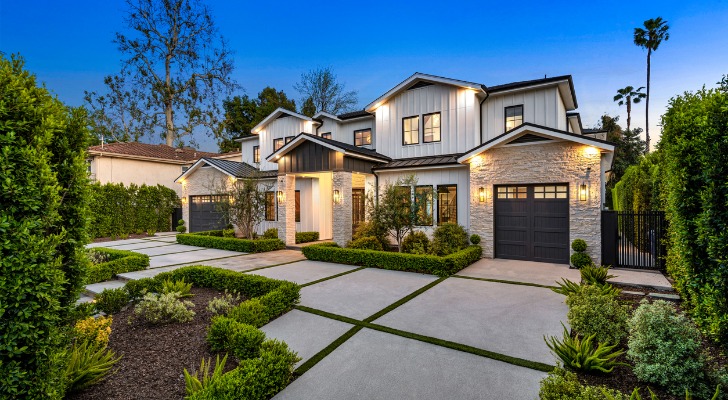A jumbo loan is a type of mortgage designed to finance high-value homes that require loans above the standard conforming loan limits. These limits are regulated by the Federal Housing Finance Agency (FHFA). They vary by location, but for most of the U.S., the 2025 limit currently stands at $806,500 for one-unit homes. Jumbo loans are not backed by government-sponsored entities like Fannie Mae and Freddie Mac. Otherwise, jumbo loans are just like conforming loans, as they come in fixed-rate and adjustable-rate variations with multiple term lengths.
Do you have questions about how the purchase of a home could affect your long-term financial plan? Connect with a financial advisor today.
What Is a Jumbo Loan?
A jumbo loan is used to buy a home that requires a mortgage that exceeds the maximum conforming loan limits set by the FHFA. These limits also double as the maximum mortgage amounts that can be purchased or backed by Fannie Mae and Freddie Mac. These government organizations are among the most common players in the mortgage industry, and they’re behind most conforming mortgages.
If you qualify for a jumbo loan, you can use it to cover your primary residence or the mortgage on an investment property, vacation home or second home. They are typically used to buy homes in high-end real estate markets.
When it comes to the mortgage terms available for jumbo loans, they’re essentially the same as conforming loans. For example, jumbo loans are often available in the common 30- and 15-year fixed-rate terms. Some lenders even offer other terms, including 10- or 20-year fixed. If you prefer adjustable-rate mortgages (ARMs), you could go for a 10/1, 7/1 or 5/1 term.
What Are the Conforming Loan Limits for 2025?
Conforming loan limits typically vary by county. The FHFA announced in November 2024 that the conforming loan limit for most counties would increase from $766,550 in 2024 to $806,500 in 2025.
In some states, counties and territories, there are higher conforming loan limits. These places are referred to as “high-cost areas” because the local median home value exceeds 115% of baseline conforming loan limit. As a result, the ceiling on loans in these high-priced areas is set at 150% of the conforming loan limit.
For example, Alaska, Hawaii, Guam and the U.S. Virgin Islands have a jumbo loan limit of $1,209,750 in 2025, which is 150% of the conforming loan limit ($806,500). Other counties may have limits somewhere between $806,500 and $1,209,750. The limit in the county you’re looking to move to will depend on the competitiveness of its real estate market and average home value.
Remember, loans that exceed these conforming loan limits are considered jumbo loans.
How to Qualify for a Jumbo Loan

Qualifying for a jumbo loan is much more difficult than qualifying for a conforming loan. As with any mortgage, there are some hoops to jump through to secure funding for your new home.
When applying for a traditional mortgage, lenders usually prefer for your debt-to-income (DTI) ratio to be below about 40%. If you’re applying for a jumbo loan, however, you generally need to have a lower DTI ratio. Lenders may be a bit more lenient if you have a lot of cash, though.
Jumbo loan applicants also typically need a higher FICO credit score than those applying for a conforming loan. Most lenders prefer you have a credit score around 700, though some may call for a score of at least 720.
Before starting the application process, it’s a good idea to have your personal financial documents in order. These include your most recent pay stubs, 1099 and W-2 forms, tax returns and bank statements. It’s critical that you have at least six months of cash ready to put toward your jumbo loan, particularly if you’re an entrepreneur or you work for yourself. Also, don’t forget your mortgage preapproval checklist.
As always, it doesn’t hurt to shop around and compare mortgage rates for jumbo loans. If you’re looking to get one, your best bet is to check out one of the big banks or find investors who are part of the secondary mortgage market. There are a variety of jumbo loans to choose from, including ones with adjustable and fixed interest rates.
Comparing Jumbo Loans vs. Conforming Loans
If you’re buying an expensive home, you can expect its peripheral costs to also be a bit pricier. The same principal applies to jumbo loans, especially if they’re well above the conforming loan limit for your county.
While many lenders will consider lowering their down payment requirements for jumbo loan applicants, most still call for the industry standard of 20%. If you make a down payment of less than 20%, you may be on the hook for private mortgage insurance (PMI), which isn’t cheap. These stipulations are the same with conforming loans.
Any time you’re dealing with a larger mortgage, fees are inherently going to be higher. These usually include origination fees, title insurance, inspection fees and service fees, which are all collectively known as “closing costs.” Be prepared to pay for these when you finally close on your new home.
Because a jumbo loan cannot be backed by Fannie Mae or Freddie Mac and they are quite large, their interest rates may be higher than their conforming loan counterparts. On the bright side, many lenders’ jumbo and conforming rates are getting closer than they once were. In general, though, expect to get a somewhat high interest rate.
Alternatives to Jumbo Loans
For borrowers who want to avoid the stricter qualifications or higher interest rates associated with jumbo loans, several alternatives may offer a more flexible or cost-effective solution. These options can help buyers secure financing without exceeding conforming loan limits or taking on the financial obligations of a jumbo loan. Below are some common alternatives to consider:
- Purchase a less expensive property: Opt for a home within conforming loan limits to simplify the financing process. This alternative can be more manageable for buyers who are flexible on location or property size.
- Larger down payment: Increase your down payment to reduce the loan amount to within conforming limits. This approach lowers monthly payments and avoids the need for a jumbo loan.
- Piggyback loan: Split the financing into two loans – a conforming loan for up to the FHFA limit and a secondary loan for the remaining amount. For example, a $900,000 home purchase might involve a conforming loan of $806,500 and a second loan for $93,500, avoiding jumbo loan qualifications.
- Regional lending programs: Explore specialized loan options from local banks or credit unions in high-cost areas, which may offer competitive rates for homes exceeding conforming loan limits.
Bottom Line

Depending on the home you want to buy and the county you’re looking to buy in, a jumbo loan might be necessary to reach your goal of homeownership. But because they can be rather expensive loans, make sure you can truly afford to keep up with the payments. No home, no matter how beautiful, is worth jeopardizing your financial security.
Home Buying Tips
- Buying a home is a major financial move. If you’re wondering how your purchase could affect your financial plan, a financial advisor can help. Finding a financial advisor doesn’t have to be hard. SmartAsset’s free tool matches you with up to three vetted financial advisors who serve your area, and you can have a free introductory call with your advisor matches to decide which one you feel is right for you. If you’re ready to find an advisor who can help you achieve your financial goals, get started now.
- Are you unsure if you should be seeking a jumbo loan for your home purchase? Try SmartAsset’s home affordability calculator to get a better picture of what you can afford.
Photo credit: ©iStock.com/WirestockInc ©iStock.com/phototechno, ©iStock.com/rappensuncle
